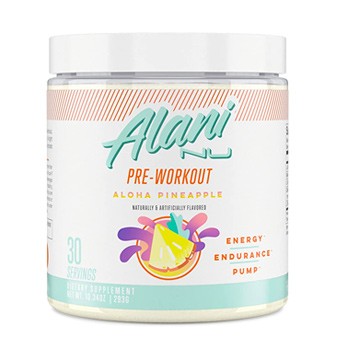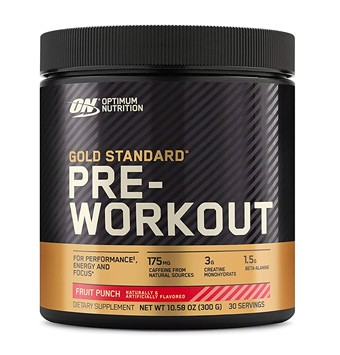WellnessVerge is reader-supported. We may earn a commission when you make a purchase through the links on this page. Learn more about our process here.
Best Pre-Workout Supplements of 2023, According to a Dietitian
Last Updated on December 26, 2022
Medically Reviewed by Anthony Dugarte, MD
A pre-workout supplement may provide an energy boost and enhance your performance. But, with the numerous number of pre-workouts currently on the market, you may be wondering which is best for you. We give you our top picks of the best pre-workout supplements, categorized based on various fitness goals.


Summary of Our Picks
- Best overall: Naked Energy
- Best for women: Alani Nu Pre-Workout
- Best for men: Optimum Nutrition Gold Standard Pre-Workout
- Best for weight loss: Ladder Sport Pre-Workout Powder
- Best for building muscle: Kaged Muscle Pre-Kaged
- Best without caffeine: Transparent Labs Stim-Free Pre-Workout
- Best budget pick: Cellucor C4 Sport Pre-Workout
How We Chose These Brands
We selected the best pre-workout supplements based on the following criteria:
- Third-party testing for purity, accuracy, and potency: Because pre-workout supplements are not regulated by the FDA (Food and Drug Administration), there is sometimes no way to prove if the product actually includes exactly what is written on a product label. A third-party testing seal assures the ingredients are of high quality and are accurately listed on the nutrition label, with precise dosing of each ingredient. Unfortunately, there are not many pre-workout supplements on the market with this official seal of approval.
- Made with research-backed, high-quality ingredients: The supplement is made with high-quality ingredients that are backed by high-level research, ideally which is published in a reputable medical journal.
- Good safety profile: Some pre-workouts contain unhealthy amounts of caffeine or other ingredients that many athletic organizations may ban. Our picks are free of these potential dangers.
What Are Pre-Workout Supplements (or Pre-Workouts)?
Before a workout, it is essential to fuel yourself properly for optimal energy and performance. Doing this will help you get the most out of your workouts and feel much better during them.
Pre-workout supplements (or “pre-workouts”) are ergogenic aids — products intended to enhance fitness performance by increasing the level of endurance and power during workouts.
They are becoming increasingly popular in the fitness industry, with many local gyms and fitness centers packing them on their shelves. Whether it be a pre-workout drink, powder, or bar, there are literally hundreds to choose from on the market.
Proponents of pre-workout supplements claim that taking them before exercise can improve your fitness ability and power you through more challenging workouts. Many people seek a “pre-workout” to boost their energy, increase stamina and performance, and enhance post-workout recovery.
Pre-workout supplements can contain various ingredients, including stimulants such as caffeine, amino acids (protein-building blocks), creatine, beta-alanine, and nitric oxide agents that increase blood flow to the muscles. (We discuss these ingredients in more detail in the “Common Ingredients Found in Pre-Workout Supplements” section of this article below.)
According to a 2018 research review, taking certain pre-workout supplements may positively influence muscular endurance and subjective mood during workouts. (1)
Another small 2016 study of 13 men found that those taking pre-workout dietary supplements containing caffeinated coffee had seen improvements in anaerobic power. (2) Anaerobic means the “absence of oxygen,” which typically refers to resistance and strength-training exercises, not cardio.
Keep in mind, however, that most studies done on pre-workout supplements are short-term studies that are less than eight weeks. More research is needed into the optimal dose of some of the ingredients present in pre-workouts.
Important Note
Always consult with your doctor before starting a new supplement to determine your individual needs.
Best Overall: Naked Energy
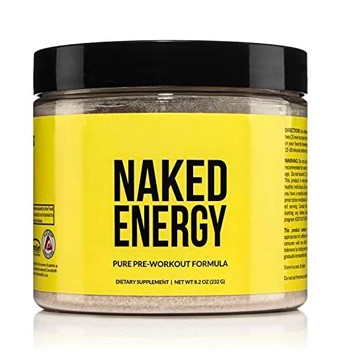
Pros
- Many ingredients are research-backed
- Produced in a GMP-certified facility
- No artificial sweeteners or flavors
Cons
- Some users report poor taste
- Strict return policy
Our Take
Naked Energy is a good, safe choice if you’re looking for a bit of a pre-workout energy boost.
Naked Energy is highly rated and considered one of the best pre-workout supplements for men and women. It is certified gluten-free, vegan, and free of dairy, soy, artificial sweeteners, and preservatives.
It comes in powder form that is recommended to be mixed in with a smoothie or energy drink. It is available in both unflavored and flavored versions.
The manufacturer states it is third-party tested by an independent lab, but we could not find any official seal of approval to confirm this. It is produced in a GMP-certified facility under good manufacturing practices.
Naked Energy contains 200 milligrams of caffeine per serving and beta-alanine, creatine, and l-arginine.
The manufacturer claims that this product improves exercise performance, enhances mental focus, and promotes faster recovery.
Price: Around $45 for 50 servings on Amazon (serving size is 2 scoops).
Instructions for Use: Mix 1–2 scoops into 8 ounces of your favorite beverage 15–30 minutes before your workout.
Best for Women: Alani Nu Pre-Workout
Pros
- Great taste
- Low in calories
- Produced in a GMP-certified facility
Cons
- Expensive
- Contains artificial sweeteners
Our Take
Alani Nu is a good-tasting pre-workout for women looking to enhance their workouts.
Alani Nu is a popular brand that sells powder supplements as well as health food products. They are considered one of the best-tasting pre-workouts and contain simple ingredient blends.
Alani Nu Pre-Workout comes in powder form and is available in multiple flavors such as Hawaiian shaved ice, pineapple, and carnival candy grape. It is rated as one of the best pre-workout powders for women on Amazon.
The manufacturers state that they are banned-substance tested and produced in a GMP-certified facility for good manufacturing practices.
This product contains minimal ingredients, including 200 mg of caffeine, l-citrulline, and beta-alanine. It also contains 500 mg of l-tyrosine, which may improve exercise performance, particularly in the heat. (3)
The company claims that this product can help maximize your workouts.
Price: Around $34 for 30 servings on Amazon (serving size is 1 scoop).
Instructions for Use: Mix 1/2–1 scoop in 6–8 ounces of water 20–30 minutes before your workout, based on tolerance.
Best for Men: Optimum Nutrition Gold Standard Pre-Workout
Pros
- Affordable price
- Excellent customer reviews
- Some ingredients are research-backed
Cons
- Not third-party tested
- Contains artificial sweeteners
Our Take
Optimum Nutrition Gold Standard Pre-Workout is a good choice for men seeking to enhance exercise performance and power during strength workouts.
Optimum Nutrition is one of the most popular workout supplement brands found in gyms and fitness centers and one of the highest-rated on Amazon.
The Gold Standard Pre-Workout is available in powder form and comes in several different flavors. The nutritional content varies slightly based on the flavor.
For men, this pre-workout supplement contains many ingredients that may support exercise performance and recovery, such as caffeine, creatine, and b-alanine. Several of these ingredients are present in clinically studied doses.
The manufacturer claims that this product enhances focus, energy, and performance.
Price: Around $32 for 30 servings on Amazon (serving size is 1 scoop).
Instructions for Use: Mix 1 scoop into 6–8 ounces of cold water and shake for 30 seconds. Consume 15–30 minutes before exercise.
Best for Weight Loss: Ladder Sport Pre-Workout Powder
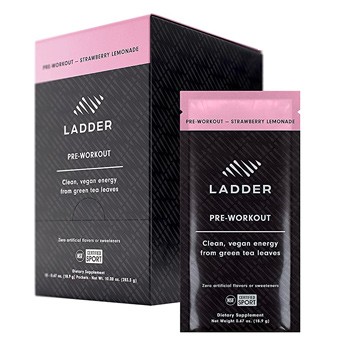
Pros
- NSF-Certified for Sport
- No artificial sweeteners
- Green tea extract may support weight loss
Cons
- Expensive
- May contain allergens
Our Take
Ladder Sport Pre-Workout Powder is a solid choice for someone looking to boost endurance, build muscle, and burn fat.
If you’re looking for the best pre-workout supplement for weight loss, Ladder is a high-quality supplement brand.
Ladder was founded by LeBron James, who consulted with health and fitness professionals to create their products. His motivation to create these products was because of the difficulty he had with finding a product that delivered results and had a solid safety profile.
Ladder Sport Pre-Workout comes in individual powder packets or a 30-serving bag with a scoop that you mix with 6–8 ounces of your favorite beverage. It is vegan and NSF-Certified for Sport.
The NSF-Certified for Sport seal of approval verifies supplement safety and label accuracy and ensures the product is free from athletic banned substances.
Fewer than 1% of supplements have this seal of approval, which assures the highest purity and safety standards.
Ladder also has multiple health experts listed on its website that are involved in creating their products, such as professional fitness trainers, nutritionists, and doctors.
Ladder Sport Pre-Workout also contains 100 mg of natural caffeine from green tea extract, shown in some studies to support weight loss. (4) This type of caffeine directly from green tea extract is also more natural and safe.
This is opposed to caffeine anhydrous, a caffeine powder that is highly potent and more often present in pre-workout supplements. The FDA has issued several warning letters to the public regarding caffeine anhydrous. (5)
The claims are that this product boosts endurance, fights fatigue, increases focus, and builds muscle.
Price: Around $55 for a 30-serving bag on Amazon (serving size is 1 scoop). You can also purchase individual on-the-go packets, prices of which vary depending on whether you purchase 15, 30, or 45 servings.
Instructions for Use: Mix 1 scoop or packet of the powder in 6–8 ounces of water 30–45 minutes before exercise. If you’re more sensitive to caffeine, it’s recommended to start with half a packet.
Best for Building Muscle: Kaged Muscle Pre-Kaged
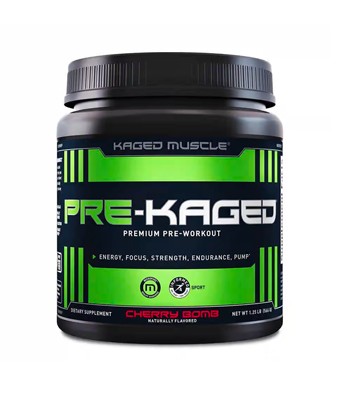
Pros
- Banned substance free
- Most ingredients are in clinically studied doses
- Vegan-friendly
Cons
- Some users report poor mixability
- Bitter taste
- Contain some unnecessary fillers like fruit concentrates
Our Take
Kaged Muscle Pre-Kaged is a solid choice for those seeking to build muscle strength and stamina. If you are sensitive to caffeine, the amount of caffeine present in this product may be too high for you.
If your main goal is to trigger incredible pumps and build muscle, you may want to give Kaged Muscle Pre-Kaged a try.
Kaged Muscle products are Informed Sport Tested, which means they test every batch to assure they are completely free of any banned substances for athletes. This provides added peace of mind to users, especially those who are competitive athletes.
The company also claims the product is third-party tested, but there is no official seal of approval on the bottle confirming this other than one regarding no banned substances.
Kaged Muscle Pre-Kaged is a potent pre-workout supplement available in powder form in several flavors such as pink lemonade, fruit punch, and berry blast.
This product contains multiple ingredients that can improve muscle strength, recovery, and exercise compacity. Many of these ingredients are in clinically effective doses, such as BCAA’s, l-citrulline, l-tyrosine, and taurine.
The amount of beta-alanine present is at a lower dose, but still may be enough to be effective with fewer side effects like tingling. (6)
It also contains a pretty hefty dose of caffeine at 274 mg per serving. It is naturally sourced from organic green coffee beans.
This product is vegan-friendly and gluten-free.
The manufacturer claims that this product helps you trigger incredible pumps, boost energy and endurance, and heighten mental focus.
Price: Around $40–$50 for 20 servings on Amazon (serving size is 1 scoop).
Instructions for Use: Mix 1 scoop with 12–16 ounces of water.
Best without Caffeine: Transparent Labs Stim-Free Pre-Workout
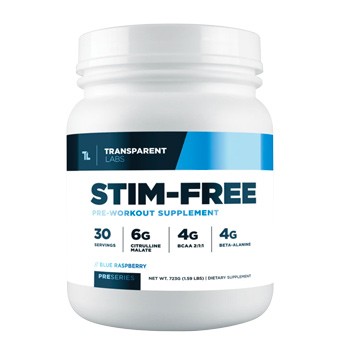
Pros
- Third-party tested
- Most ingredients are in clinically studied doses
- Priced well compared to competition
Cons
- Potential side effects from one ingredient present
- A few ingredients have mixed results in efficacy
Our Take
Transparent Labs Stim-Free Pre-Workout is a solid choice for a low stim pre-workout for caffeine-sensitive individuals.
If you are caffeine-sensitive, a caffeine-free workout drink may be the best choice for you.
Transparent Labs is a well-respected brand that prides itself on the full transparency of its products and ingredients. All of their products are third-party tested and provide certificates outlining testing results on their website.
It is available in powder form with several flavor options.
It contains multiple ingredients, many of which are in clinically effective doses, such as beta-alanine, l-tyrosine, and taurine.
It does contain Betapure Betaine Anhydrous, which may cause side effects such as GI upset, and in rare cases, cerebral edema. (7)
This product is non-GMO, gluten-free, and contains no artificial flavors, preservatives, or colors.
The manufacturer claims that this product increases nitric oxide to the muscles, enhances focus and endurance, and promotes lean muscle gains.
Price: $49.99 for 30 servings (serving size is 1 scoop).
Instructions for Use: Begin with a 1/2 scoop mixed with 6–8 ounces of water 20–30 minutes before exercise. Once tolerance is established, increase it to 1 scoop mixed in 12–16 ounces of water.
Best Budget Pick: Cellucor C4 Sport Pre-Workout
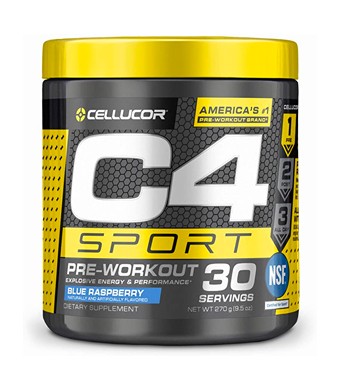
Pros
- NSF-Certified for Sport
- Well-respected brand
- Affordable price
Cons
- Potential for side effects
- Contains a proprietary blend
Our Take
Cellucor C4 Sport is an excellent pre-workout choice for someone watching their budget. It does contain a proprietary blend, which makes it more challenging to know how much of each ingredient you’re taking.
If you’re on a tight budget, Cellucor C4 Sport Pre-Workouts is one of the best-selling and respected pre-workout brands on Amazon and is sold at an affordable price.
It comes in powder form with several flavor options.
It contains many common ingredients found in pre-workouts, such as caffeine, creatine, arginine, beta-alanine, and B-vitamins.
It does contain 135 milligrams of caffeine anhydrous, so we would not recommend it for caffeine-sensitive people as it is equivalent to the amount of caffeine in one cup of strong coffee.
It is third-party tested and NSF-Certified for Sport, ensuring it is held to the highest safety and quality standards. It contains only five calories per serving and no added sugar.
The manufacturer claims that this product can help build muscle mass and strength and increase your rep count.
Price: $21.99 for 30 servings (serving size is 1 scoop).
Instructions for Use: Mix 1 scoop with 6–8 ounces of water 20–30 minutes before exercise. The brand also recommends drinking plenty of water during your workout.
Common Ingredients Found in Pre-Workout Supplements
These are the most common ingredients found on a pre-workout supplement label. (8) Some of these ingredients have been researched to some extent, but most warrant further research regarding the optimal dose for effectiveness and safety.
Caffeine
A stimulant intended to enhance performance and speed.
A 2021 research review found that consuming caffeine 60 minutes before a workout may improve exercise performance in some individuals. The optimal dose range studied is between 150–450 milligrams of caffeine per day, depending on body weight. (9)
It is also important to note that there is an upper limit for caffeine consumption of up to 400 mg per day. This is the equivalent of about 4–5 cups of coffee. For those who are caffeine-sensitive, even staying within this limit may be too much. (10)
Other caffeine-containing beverages include coffee, tea, soda, or energy drinks, so all of these should be considered when determining your daily caffeine intake.
Potential side effects of consuming too much caffeine include insomnia, jitters, increased heart rate, anxiousness, and even seizures in some people.
Understanding Caffeine: Is It Good or Bad For Your Health?
Creatine
Creatine is a substance found naturally in muscle cells that helps produce energy during high-intensity exercise. It is also found in animal products such as dairy, meat, and fish.
The supplement dose that is most clinically effective for maintenance is 1.2 grams per day. (11, 6)
Creatine 101: Benefits, Types, Dosage, and Safety
Branched-Chain Amino Acids (BCAAs)
Leucine, isoleucine, and valine are amino acids said to enhance recovery and promote muscle growth. According to a 2006 clinical trial, leucine supplementation may enhance muscle protein synthesis after exercise. (12)
Taurine
An amino acid that may boost muscle strength during workouts and reduce exercise-related fatigue. It is also naturally found in meat, fish, and dairy.
The safest, most effective doses in studies range from 500–2000 milligrams per day. (13, 14)
Beta-Alanine
An amino acid that can provide a quick energy boost for shorter workouts.
According to a 2012 meta-analysis, beta-alanine has the potential to increase exercise capacity. A dose of 4–6 grams per day is most commonly studied in the research. However, a dose of 1–2 grams appears to also provide benefits with less risk for side effects, such as tingling. (6, 15, 16)
L-Tyrosine
An amino acid precursor to dopamine that has the potential to increase exercise capacity, specifically in the heat.
The most common doses of L-tyrosine studied in the research range from 500–2000 mg per day. (17, 3)
B-Vitamins
Vitamins such as B1, B6, and B12 are claimed to boost energy and metabolism.
While studies have shown that a deficiency in these B-vitamins can cause physical fatigue, the research is not clear whether taking B-vitamins will provide additional energy if you are not deficient. (18)
Nitric Oxide Boosters
Ingredients such as L-arginine, L-citrulline, and beetroot juice increase blood flow and improve athletic performance.
For L-arginine, doses of 1–6 grams and up to 9 grams per day have shown to be the most effective with minimal risk for side effects. For L-citrulline, clinical doses of 3–6 grams have been studied.
For beetroot juice, at least a 1 gram dose is often seen in supplements and studied in research. (19, 20, 21, 22)
Proprietary Blends
These are formulated blends of various ingredients present in many pre-workout supplements.
The label lists the total dose of all ingredients combined, but not the dose of each individual ingredient.
We often recommend shying away from these blends when possible because it is difficult to determine how much of a particular ingredient you are consuming.
Frequently Asked Questions About Pre-Workout Supplements
What are the benefits of taking a pre-workout supplement?
Certain ingredients in pre-workout supplements may improve athletic performance, according to a 2018 research review. (23)
While not all ingredients are backed by science, some may provide a moderate boost in energy, endurance, and strength.
Are there any safety concerns from taking pre-workouts?
Some pre-workout ingredients may cause side effects in certain people, such as caffeine, betaine, or beta-alanine in high doses.
One particular ingredient of concern present in many pre-workouts is caffeine anhydrous, a more potent powder form of caffeine. (5)
The most common side effects reported from pre-workouts include the jitters or a tingling sensation, water retention (if it contains creatine), and GI upset. (24)
In one study involving 1000 people taking pre-workout supplements, about half reported side effects such as nausea, tingling, or heart abnormalities. (24)
This is a large percentage of people experiencing side effects and is concerning.
Always consult with your medical doctor before starting any new supplement to weigh the pros and cons.
If you are caffeine-sensitive, taking a stim-free pre-workout may reduce these potential side effects.
When should I consider a pre-workout supplement?
You may want to consider a pre-workout if you are already eating a balanced diet but are hoping for an additional boost in your exercise performance.
A pre-workout supplement will not replace a healthy diet, and so it will be most effective if you are fueling yourself properly and drinking plenty of water.
Who should avoid pre-workout supplements?
Those who are pregnant, have any sensitivities or allergies to the ingredients present or have cardiovascular or kidney issues should avoid pre-workouts.
Some pre-workouts contain creatine, which may cause water retention in some people, a problem already present in the case of heart or kidney problems. (25)
Regardless of these circumstances, we always recommend checking with your doctor prior to starting a pre-workout supplement.
When is the best time to take a pre-workout supplement?
For best results, it is recommended to take your pre-workout supplement 30–60 minutes before your workout. (26)
I don’t want to take supplements all the time. Are there certain foods that can boost my exercise performance?
Absolutely! The right foods can be just as effective in providing the energy boost you’re looking for.
Within an hour before your workout, having a combination of carbs and protein is most beneficial.
Incorporating a carb such as whole grain bread or fruit for carbs and a protein such as peanut butter or greek yogurt are good choices.
The Bottom Line
Pre-workout supplements may provide a temporary, modest boost in energy before a workout. But, they are not a miracle cure. There is research on some of their ingredients, but long-term studies on their effectiveness and safety are still evolving.
Before you decide on a pre-workout supplement, it’s essential to know your main reason for taking it. Doing a bit of research before heading to the store can help you make the best decision that fits your goals.
For example, if you’re trying to boost muscle strength and size, you may want to look for a supplement containing BCAA’s.
It’s also important to know that everyone responds differently to these supplements. It can help to understand how your body typically responds to certain ingredients, such as caffeine, for example.
If you choose to take a pre-workout containing caffeine, make sure to account for any other caffeine-containing products such as coffee, tea, soda, or energy drinks to assure you’re not going above the FDA’s 400 mg daily caffeine allowance. (10)
Alternatively, if you’re sensitive to caffeine’s effects, there are low-caffeine or caffeine-free pre-workouts available.
It is best to opt for supplements that are third-party tested for peace of mind. And if you’re thinking about starting a pre-workout, check with your medical doctor to weigh the pros and cons.
Additional Tips for Your Workouts
Eating a balanced diet that includes a healthy pre-workout snack, such as a banana with peanut butter, will also help fuel your workouts effectively. It’s also equally as important to stay well hydrated and get enough sleep.
At WellnessVerge, we only use reputable sources, including peer-reviewed medical journals and well-respected academic institutions.
- Multi-ingredient pre-workout supplements, safety implications, and performance outcomes: a brief review:
https://jissn.biomedcentral.com/articles/10.1186/s12970-018-0247-6 - The effect of acute pre-workout supplementation on power and strength performance:
https://jissn.biomedcentral.com/articles/10.1186/s12970-016-0138-7 - Oral tyrosine supplementation improves exercise capacity in the heat:
https://link.springer.com/article/10.1007/s00421-011-1921-4 - The Effect of Green Tea Extract on Fat Oxidation at Rest and during Exercise: Evidence of Efficacy and Proposed Mechanisms1:
https://www.ncbi.nlm.nih.gov/pmc/articles/PMC3649093/ - Pure and Highly Concentrated Caffeine:
https://www.fda.gov/food/dietary-supplement-products-ingredients/pure-and-highly-concentrated-caffeine - Timing, optimal dose and intake duration of dietary supplements with evidence-based use in sports nutrition:
https://www.ncbi.nlm.nih.gov/pmc/articles/PMC5545206/ - LiverTox: Clinical and Research Information on Drug-Induced Liver Injury:
https://www.ncbi.nlm.nih.gov/books/NBK548774/ - Common Ingredient Profiles of Multi-Ingredient Pre-Workout Supplements:
https://www.ncbi.nlm.nih.gov/pmc/articles/PMC6413194/ - International society of sports nutrition position stand: caffeine and exercise performance:
https://jissn.biomedcentral.com/articles/10.1186/s12970-020-00383-4 - Spilling the beans - how much caffeine is too much?:
https://www.fda.gov/consumers/consumer-updates/spilling-beans-how-much-caffeine-too-much - International Society of Sports Nutrition position stand: safety and efficacy of creatine supplementation in exercise, sport, and medicine:
https://jissn.biomedcentral.com/articles/10.1186/s12970-017-0173-z - Leucine regulates translation initiation of protein synthesis in skeletal muscle after exercise:
https://pubmed.ncbi.nlm.nih.gov/16424142/ - Role of taurine supplementation to prevent exercise-induced oxidative stress in healthy young men:
https://pubmed.ncbi.nlm.nih.gov/15042451/ - Risk assessment for the amino acids taurine, L-glutamine and L-arginine:
https://pubmed.ncbi.nlm.nih.gov/18325648/ - International society of sports nutrition position stand: Beta-Alanine:
https://www.ncbi.nlm.nih.gov/pmc/articles/PMC4501114/ - Effects of β-alanine supplementation on exercise performance: a meta-analysis:
https://www.ncbi.nlm.nih.gov/pmc/articles/PMC3374095/ - Oral tyrosine supplementation improves exercise capacity in the heat:
https://pubmed.ncbi.nlm.nih.gov/21437603/ - Vitamins and Minerals for Energy, Fatigue and Cognition: A Narrative Review of the Biochemical and Clinical Evidence:
https://www.ncbi.nlm.nih.gov/pmc/articles/PMC7019700/ - Pre-exercise arginine supplementation increases time to exhaustion in elite male wrestlers:
https://www.ncbi.nlm.nih.gov/pmc/articles/PMC4135062/ - Growth hormone, arginine and exercise:
https://pubmed.ncbi.nlm.nih.gov/18090659/ - Citrulline malate enhances athletic anaerobic performance and relieves muscle soreness:
https://pubmed.ncbi.nlm.nih.gov/20386132/ - Effects of Beetroot Juice Supplementation on Cardiorespiratory Endurance in Athletes. A Systematic Review:
https://www.ncbi.nlm.nih.gov/pmc/articles/PMC5295087/ - Multi-ingredient pre-workout supplements, safety implications, and performance outcomes: a brief review:
https://pubmed.ncbi.nlm.nih.gov/30089501/ - Common Habits, Adverse Events, and Opinions Regarding Pre-Workout Supplement Use Among Regular Consumers:
https://www.ncbi.nlm.nih.gov/pmc/articles/PMC6520716/ - Creatine monohydrate supplementation on body weight and percent body fat:
https://pubmed.ncbi.nlm.nih.gov/14636103/ - The effect of acute pre-workout supplementation on power and strength performance:
https://www.ncbi.nlm.nih.gov/pmc/articles/PMC4947244/

